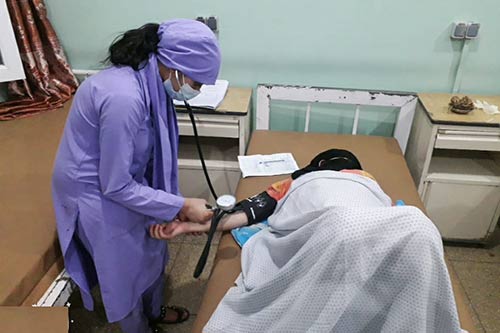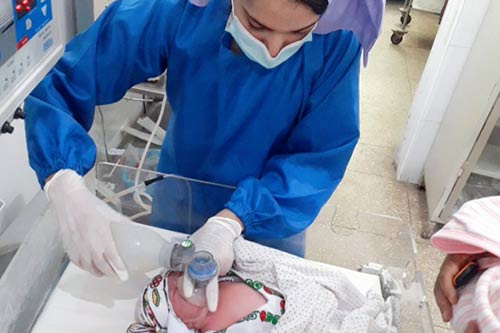News
Student midwives persevere amid conflict and pandemic in Afghanistan
- 12 August 2021
News
KANDAHAR, Afghanistan – The COVID-19 pandemic is not the only crisis preventing students from attending class. The recent and intensified conflicts all over Afghanistan, particularly in Kandahar Province, have also resulted in widespread fear and movement restrictions – especially among women.
But some classes are simply too crucial to miss. That was the case for 19-year-old Fariba and her 24 classmates, all from different districts of southern Afghanistan, who were determined to continue their studies at the Community Midwifery Education (CME) course in Kandahar City. “Neither threats of COVID-19 nor conflict will stop me from completing my education,” Fariba vowed.

Investments in public health over the past decade have generally improved access to health care. Still, Afghanistan’s public health facilities are unable to reach substantial swaths of the country, especially in remote and conflict-affected areas. Between 2007 and 2017, less than 60 per cent of women in Afghanistan had at least one antenatal care appointment during pregnancy, and from 2013 to 2018 less than 60 per cent of births in Afghanistan were attended by skilled health personnel.
The absence of these life-saving services contributes to Afghanistan’s maternal mortality ratio, which remains one of the highest in the world.
UNFPA has been working with the Ministry of Public Health to train midwives through the CME programme, helping to increase midwifery services in rural areas and lower preventable maternal and newborn deaths. In Kandahar Province, the midwifery education programme is also supported by Global Affairs Canada.
Fariba joined the programme after a community awareness-raising session in her village. “It was the first time I learned about this opportunity for women to start midwifery education, and I decided to do it,” she said. “I discussed it with my family and asked for their support, and I was allowed to enroll.”
The programme currently is a two-year course, after which graduates are deployed in their villages to serve local populations – particularly pregnant women and children.
The toughest moments for Fariba were attending practical sessions and supporting childbirths. “I was worried my inexperience could impact the delivery,” she recalled.
The midwifery students start to attend births, under the supervision of mentors, during their second semester. “Prior to entering the delivery room, I was fully trained on the process and necessary steps and what I was expected to provide,” Fariba said. “But nothing could prepare me for the actual birth, and I learned so much shadowing and assisting my mentor.”

The CME courses were interrupted by the alarming increase in COVID-19 cases in late May, when many educational centres and institutions closed. The classes remain closed today, but students like Fariba continue to diligently study at home. “We received our learning materials and modules to study at home. Hopefully school will start again soon.”
But today, the escalating hostilities are also taking a serious toll, with the rapid spread of violence to many parts of the country. More women and more children were injured or killed in the first half of 2021 than ever recorded by the United Nations Assistance Mission in Afghanistan in the first half of any calendar year. Continuing insecurity will prolong the closure of the on-site CME courses.
Meanwhile, Fariba, one of the top students in her class, remains eager to resume her studies so that she can get to work supporting the women in her village. “I wish to be a successful midwife and serve women and children in my community,” she said.
When she and her fellow students are finally able to graduate, their aim is to provide services to areas cumulatively covering some 55,000 underserved people. Fariba and her classmates are scheduled to graduate in the spring of 2022.